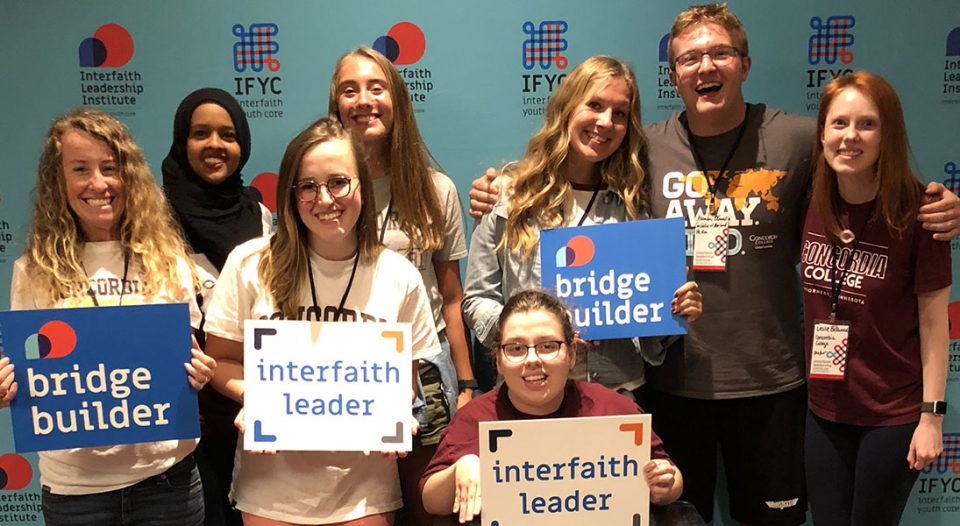Editor’s note: “There are no young people here” is a common refrain as some worry about the future of the church. But young adults are indeed active across the ELCA and have powerful faith stories to share. This series will highlight young leaders who are boldly pursuing God’s call and extending the ministry of the church.
College students are preparing to enter a society that has growing religious diversity and a rising number of attacks on places of worship motivated by religious hate. The duality of this context can make for a daunting entry into a religiously and culturally pluralistic world, and it’s one ELCA colleges and universities hope to help students navigate.
The Network of ELCA Colleges and Universities formed the Interreligious Coordinating Committee in 2014 to discuss what it would look like for Lutheran schools to engage in interreligious work together. Leaders at ELCA-affiliated schools believe graduates should have some interreligious knowledge and experience.
“We do this work because the world desperately longs for more people who can cultivate hope instead of hate, reconciliation instead of division, and cooperation instead of conflict,” said Jacqueline Bussie, religion professor and director of the Forum on Faith and Life at Concordia College, Moorhead, Minn.
Jen Rude, campus pastor of Pacific Lutheran University in Tacoma, Wash., agreed: “Whether a graduate becomes a nurse, a business person, a teacher, an engineer, a politician or really any profession, they will certainly interact with people of different faiths, and interfaith skills are critical.”
Half of the ELCA’s 26 colleges and universities are connected with the Interreligious Coordinating Committee. Interreligious engagement on these campuses ranges widely in academic and cocurricular settings.
Augsburg University, Minneapolis, approaches the integration of interreligious programming through four components: intellectual exploration, spiritual practice, social action and community involvement. These components show up in academic courses, campus faith organizations and participation in community events.
“Because Augsburg and our surrounding neighborhood is so diverse, we believe that interfaith relationships happen every day on campus,” said Mark S. Hanson, former ELCA presiding bishop and executive director of the school’s Bernhard Christensen Center for Vocation. “It’s marvelous how being in a diverse context doesn’t dilute our [religious traditions] but deepens and sharpens.”
Concordia and Bethany College, Lindsborg, Kan., offer minors in interfaith studies—an academic program that is only available at 15 schools in the United States.
“Concordia’s Interfaith Studies minor has courses from over 13 disciplines,” Bussie said, adding that it’s the perfect supplement to any major because it gives young adults the knowledge and skills to engage in a religiously diverse world.
The minor at Bethany is designed for students in programs such as business, education or nursing. “The goal is to create awareness of how religious diversity is all around us in ways we don’t recognize right away,” said Adam Pryor, the school’s dean of academic affairs and associate professor of religion.
“I have been able to learn the ways in which faith, spirituality and religion form a part of a person’s identity, and the importance in recognizing and valuing each individual’s experience with faith.”
Pacific Lutheran and Capital University in Columbus, Ohio, create opportunities for interreligious understanding for students outside of the classroom. Both schools have opened dedicated spaces for interfaith prayer and meditation.
“If we’re going to be committed to an interfaith experience, we must provide these spaces so these students can fully live their tradition,” said Drew Tucker, campus pastor of Capital.
Students who participate in the interreligious programs say they experience benefits in both their education and personal growth.
“I have been able to learn the ways in which faith, spirituality and religion form a part of a person’s identity, and the importance in recognizing and valuing each individual’s experience with faith,” said Kara Barkman, a recent graduate of Pacific Lutheran who was involved in the school’s Interfaith Working Group. “As a person of faith, articulating my own faith journey and beliefs to peers has helped me form more of an idea of what faith and spirituality mean to me.”
Students say interreligious programming also makes them feel more equipped to interact and build relationships in a pluralistic world.
Kara Selland, a student in Concordia’s interfaith studies minor, said, “Learning who our neighbors are and what may be important to them is crucial. My interfaith courses have prepared me to enter this world with the skills necessary for effective communication and bridge building.”
Moriah Reichert, a recent Capital graduate who studied religion, said, “My openness toward, and knowledge and respect of, other traditions makes me a better academic, and that helps me to be in community with and appreciate siblings who are walking the path of faith, even if it is a little different from me.”
Andrew Thompson, another recent Capital graduate, agreed: “Through interfaith partnerships, celebrations and dialogue together, I have been able to build deep relationships with folks from a variety of religious traditions. Through this common ground built upon mutual affirmation and dialogue, I feel much more equipped to continue building bridges between my spiritual context and other religious traditions.”
Next month this series will feature young adult delegates at the ELCA Churchwide Assembly.





